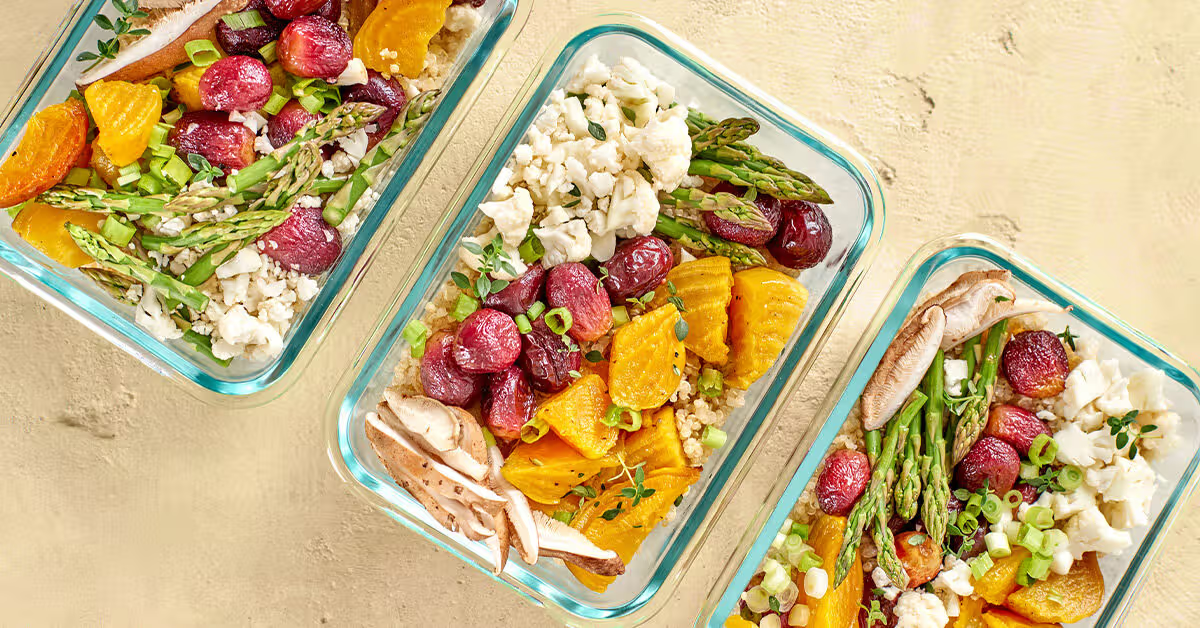Meal prepping is an effective strategy for individuals seeking to improve their eating habits while managing a busy lifestyle. By planning and preparing meals in advance, you can save time, reduce food waste, and enjoy healthier, home-cooked options without the stress of daily cooking. This article provides essential insights into the benefits of meal prepping, highlights key ingredients for successful preparation, and offers creative ideas tailored to various dietary preferences.
Whether you’re new to meal prepping or looking to enhance your existing routine, the following sections will guide you through practical tips and strategies to maintain consistency and make meal prep an integral part of your weekly schedule.
In this article you will find:
Benefits of MealPrep for Health and Time Management
In today’s fast-paced world, finding the balance between maintaining a healthy diet and managing a busy schedule can be challenging. MealPrep emerges as a powerful solution, offering numerous benefits that enhance both health and time management. By preparing meals in advance, individuals can streamline their eating habits, save precious time, and ultimately improve their overall well-being.
Enhancing Nutritional Quality
One of the primary advantages of meal prepping is the ability to control the nutritional quality of your meals. When you prepare your meals ahead of time, you can:
- Choose Whole Foods: Focus on incorporating fresh fruits, vegetables, whole grains, and lean proteins into your meals, ensuring a balanced diet.
- Portion Control: By measuring and dividing meals into appropriate portions, you can prevent overeating and better manage your caloric intake.
- Limit Processed Foods: Meal prepping reduces the temptation to rely on fast food or convenience meals, which are often high in unhealthy fats, sugars, and preservatives.
Time Efficiency and Convenience
Time management is crucial for busy individuals, and meal prepping is an effective strategy to reclaim valuable hours in your week. Here’s how:
- Batch Cooking: Preparing large quantities of food at once allows you to cook efficiently, reducing the time spent in the kitchen throughout the week.
- Easy Access to Meals: Having pre-prepared meals on hand means you can quickly grab a nutritious option instead of spending time cooking or ordering takeout.
- Streamlined Grocery Shopping: With a meal plan in place, grocery shopping becomes more focused and efficient, reducing impulse buys and food waste.
Promoting Healthy Habits
Meal prepping not only supports immediate health goals but also fosters long-term healthy habits. Regularly engaging in meal preparation can lead to:
- Increased Mindfulness: Taking the time to plan and prepare meals encourages a more mindful approach to eating, allowing you to appreciate the food you consume.
- Consistency in Eating Patterns: Having meals ready reduces the likelihood of skipping meals or making unhealthy choices due to time constraints.
- Encouragement of Culinary Skills: As you practice meal prepping, you can experiment with new recipes and cooking techniques, enhancing your culinary repertoire.
Financial Benefits
In addition to health and time management, meal prepping can lead to significant financial savings. Consider the following:
- Reduced Food Waste: By planning meals and using ingredients efficiently, you can minimize food waste and save money on groceries.
- Cost-Effective Meals: Cooking at home is generally less expensive than dining out, allowing you to enjoy nutritious meals without breaking the bank.
- Bulk Purchasing: Buying ingredients in bulk for meal prep can further decrease costs, especially for staples like grains, legumes, and proteins.
In summary, meal prepping offers a multitude of benefits that can significantly enhance your health and time management. By prioritizing nutritious meals, streamlining your cooking process, and fostering healthy habits, you can transform your lifestyle for the better. For more insights on meal prepping and its advantages, check out this comprehensive guide on meal prepping.
Essential Ingredients for Effortless MealPrep
Meal prepping can revolutionize your approach to healthy eating, but the key to success lies in selecting the right ingredients. By choosing versatile, nutrient-dense foods, you can create a variety of meals that are both delicious and satisfying. This section will explore essential ingredients that make meal prep not only effortless but also enjoyable.
Proteins: The Building Blocks
Including a variety of protein sources in your meal prep is crucial for muscle repair, satiety, and overall health. Consider these options:
- Lean Meats: Chicken breast, turkey, and lean cuts of beef or pork are excellent choices that can be grilled, baked, or sautéed for quick meals.
- Fish: Salmon, tuna, and tilapia are rich in omega-3 fatty acids and can be prepared in bulk, offering a nutritious addition to salads and grain bowls.
- Plant-Based Proteins: Beans, lentils, chickpeas, and tofu provide essential nutrients and are perfect for vegetarian or vegan meal prep.
Whole Grains for Sustained Energy
Whole grains are a fantastic source of complex carbohydrates, providing sustained energy throughout the day. Incorporate these grains into your meal prep:
- Quinoa: This gluten-free grain is a complete protein and cooks quickly, making it a staple for salads and bowls.
- Brown Rice: A versatile option that pairs well with almost any protein and vegetable, brown rice is a filling base for meals.
- Oats: Ideal for breakfast meal prep, oats can be used in overnight oats or baked goods for a nutritious start to your day.
Fruits and Vegetables: Nutrient Powerhouses
Fruits and vegetables are essential for a balanced diet, providing vitamins, minerals, and antioxidants. Here are some tips for incorporating them into your meal prep:
- Seasonal Vegetables: Choose a variety of seasonal produce for freshness and flavor. Roasting or steaming vegetables in bulk can enhance their taste and make them easy to add to meals.
- Leafy Greens: Spinach, kale, and arugula are nutrient-dense options that can be used in salads, smoothies, or as a base for grain bowls.
- Frozen Fruits: Stock up on frozen fruits for smoothies or as toppings for oatmeal and yogurt. They retain their nutritional value and can be a convenient option.
Healthy Fats for Flavor and Satiety
Incorporating healthy fats into your meals is vital for flavor and keeping you satisfied. Consider these sources:
- Avocados: Rich in monounsaturated fats, avocados are perfect for spreading on toast or adding to salads.
- Nuts and Seeds: Almonds, walnuts, chia seeds, and flaxseeds are great for snacking or adding to dishes for extra crunch and nutrition.
- Olive Oil: Use extra virgin olive oil for cooking or as a dressing to enhance the flavor of your meals while providing healthy fats.
Herbs and Spices: Elevate Your Meals
To keep your meals exciting and flavorful, don’t forget to include a variety of herbs and spices. These can transform simple ingredients into gourmet dishes:
- Fresh Herbs: Basil, cilantro, parsley, and dill can add brightness to your meals. Consider growing a small herb garden for easy access.
- Spices: Cumin, paprika, turmeric, and garlic powder can enhance the flavor profile of your dishes without adding extra calories.
- Hot Sauces and Condiments: A dash of hot sauce or a drizzle of balsamic vinegar can add a burst of flavor to your meals.
By incorporating these essential ingredients into your meal prep routine, you can create a diverse array of nutritious meals that are easy to prepare and enjoyable to eat. For more tips on meal prepping and ingredient selection, visit Lifesum’s ultimate guide.
Creative MealPrep Ideas for Diverse Diets
Meal prepping is a versatile strategy that can cater to various dietary preferences and restrictions, making healthy eating accessible for everyone. Whether you follow a vegan, keto, paleo, or gluten-free diet, creative meal prep ideas can help you maintain your nutritional goals while enjoying delicious meals. In this section, we’ll explore innovative meal prep concepts tailored for different dietary needs.
Vegan MealPrep Ideas
For those following a vegan diet, meal prepping can be a delightful way to ensure you’re getting enough protein and nutrients. Here are some creative ideas:
- Chickpea Salad Jars: Layer chickpeas, diced cucumbers, cherry tomatoes, and spinach in mason jars. Top with a lemon-tahini dressing for a refreshing meal that stays fresh all week.
- Quinoa-Stuffed Peppers: Roast bell peppers filled with a mixture of quinoa, black beans, corn, and spices. These can be frozen and reheated as needed.
- Vegan Buddha Bowls: Prepare a variety of roasted vegetables, grains like farro or brown rice, and a protein source such as tofu. Assemble bowls for easy grab-and-go lunches.
Keto MealPrep Ideas
For those on a ketogenic diet, focusing on low-carb, high-fat meals is key. Here are some meal prep ideas to keep you satisfied:
- Egg Muffins: Whisk eggs with spinach, cheese, and diced bell peppers, then bake in muffin tins for a quick breakfast option that is easy to reheat.
- Zucchini Noodles with Pesto: Spiralize zucchini and toss it with homemade or store-bought pesto. Add grilled chicken or shrimp for a protein boost.
- Cauliflower Fried Rice: Pulse cauliflower florets in a food processor to create rice-sized pieces, then stir-fry with vegetables and your choice of protein for a low-carb meal.
Paleo MealPrep Ideas
The paleo diet emphasizes whole foods and eliminates processed ingredients. Here are some paleo-friendly meal prep concepts:
- Sweet Potato and Chicken Skillet: Sauté diced sweet potatoes with chicken breast, onions, and your favorite spices for a hearty meal that can be stored in individual containers.
- Veggie-Packed Frittata: Bake a frittata using eggs, spinach, mushrooms, and bell peppers for a nutrient-dense breakfast that can be sliced and stored for the week.
- Beef and Broccoli Stir-Fry: Cook lean beef with broccoli and a homemade sauce of coconut aminos and garlic for a quick and satisfying dinner option.
Gluten-Free MealPrep Ideas
For those with gluten sensitivities, meal prepping can ensure safe and nutritious meals. Consider these gluten-free options:
- Quinoa and Roasted Vegetable Bowls: Combine cooked quinoa with an assortment of roasted vegetables and a drizzle of balsamic glaze for a filling meal.
- Stuffed Sweet Potatoes: Bake sweet potatoes and stuff them with black beans, avocado, and salsa for a nutritious and gluten-free lunch.
- Chili with Beans: Prepare a large pot of chili using ground turkey or beef, beans, and plenty of spices. Portion it out for easy meals throughout the week.
Incorporating Global Flavors
Don’t be afraid to experiment with international cuisines to keep your meal prep exciting. Here are a few ideas:
- Thai Peanut Chicken Bowls: Marinate chicken in a peanut sauce and serve it over rice with steamed broccoli and carrots.
- Mediterranean Grain Bowls: Combine cooked farro or quinoa with olives, feta cheese, diced cucumbers, and a drizzle of olive oil for a refreshing Mediterranean-inspired meal.
- Indian-Spiced Lentils: Prepare lentils cooked with turmeric, cumin, and ginger for a flavorful dish that can be paired with brown rice or cauliflower rice.
By incorporating these creative meal prep ideas, you can cater to a variety of dietary needs while keeping your meals enjoyable and diverse. For more meal prep inspiration and recipes, check out this comprehensive guide on meal prepping.
Tips for Staying Consistent with Your MealPrep Routine
Establishing a successful meal prep routine can significantly enhance your dietary habits and overall health. However, consistency is key to reaping the benefits of meal prepping. Here are practical tips to help you stay committed to your meal prep journey, ensuring that healthy eating becomes a seamless part of your lifestyle.
Create a Meal Prep Schedule
Setting a specific day and time for meal prepping can help make it a regular part of your routine. Consider the following:
- Choose a Day: Many people find weekends the best time to prep meals for the week ahead. Select a day that works for you and stick to it.
- Time Block: Allocate a specific block of time dedicated solely to meal prep. This focused approach can improve efficiency and reduce distractions.
- Set Reminders: Use calendar alerts or reminders on your phone to prompt you when it’s time to prep, helping to build the habit.
Start Small and Build Gradually
If you’re new to meal prepping, it’s essential to start small. Overcommitting can lead to burnout. Here’s how to ease into it:
- Prep One Meal: Begin by prepping one meal for the week. As you become comfortable, gradually increase the number of meals you prepare.
- Focus on Simplicity: Choose simple recipes that require minimal ingredients and time. This can help you avoid feeling overwhelmed.
- Experiment with Different Meals: Try different recipes and see what works best for you. This keeps things interesting and prevents monotony.
Utilize Quality Containers
The right storage containers can make a significant difference in your meal prep experience. Consider these tips:
- Invest in BPA-Free Containers: Choose durable, microwave-safe containers that are easy to stack and store. Glass containers are a great option for longevity and safety.
- Label Your Meals: Use labels to indicate the contents and date of preparation. This helps you keep track of freshness and makes meal selection easier.
- Use Portion Control Containers: These can help you maintain appropriate serving sizes, ensuring balanced meals and reducing food waste.
Incorporate Variety to Keep It Interesting
To prevent boredom with your meals, incorporate variety into your meal prep routine:
- Rotate Recipes: Create a rotating schedule of recipes so that you’re not eating the same meals every week. This keeps your palate excited.
- Mix and Match Ingredients: Use different proteins, grains, and vegetables each week to create new combinations and flavors.
- Explore Global Cuisines: Experiment with international recipes to introduce new flavors and ingredients into your meal prep.
Stay Accountable
Accountability can be a powerful motivator in maintaining your meal prep routine. Here are some strategies:
- Share Your Goals: Tell friends or family about your meal prep plans. Sharing your goals can create a support system that encourages consistency.
- Join Online Communities: Participate in meal prep groups or forums where you can share ideas, recipes, and progress with others who have similar goals.
- Track Your Progress: Keep a journal or use an app to track your meal prep activities and how it affects your health and energy levels.
Plan for Flexibility
Life can be unpredictable, and it’s essential to allow for flexibility in your meal prep routine:
- Have Backup Meals: Prepare a few extra meals or keep healthy snacks on hand for busy days when you may not have time to cook.
- Adjust as Needed: If you find that certain meals aren’t working for you, don’t hesitate to adjust your plan. Meal prepping should fit your lifestyle, not the other way around.
- Be Kind to Yourself: If you miss a week or fall off track, don’t be discouraged. Acknowledge it and get back to your routine the following week.
By implementing these tips, you can create a sustainable meal prep routine that fits seamlessly into your lifestyle. For additional insights on meal prepping, check out this helpful guide on meal prepping. Meal prepping offers numerous benefits, including enhanced health, time management, and significant financial savings. By planning meals and using ingredients efficiently, you can reduce food waste, enjoy cost-effective home-cooked meals, and take advantage of bulk purchasing for staples. Essential ingredients for meal prep include diverse protein sources, whole grains, seasonal fruits and vegetables, healthy fats, and a variety of herbs and spices to keep meals flavorful and nutritious.
To maintain a consistent meal prep routine, create a schedule that works for you, start small, and gradually build up your meal prep efforts. Utilize quality storage containers, incorporate variety to prevent boredom, and stay accountable by sharing your goals with others. Flexibility is also key; prepare backup meals for busy days and adjust your plans as needed to ensure meal prepping fits seamlessly into your lifestyle. For more insights, consider exploring additional meal prep resources.




